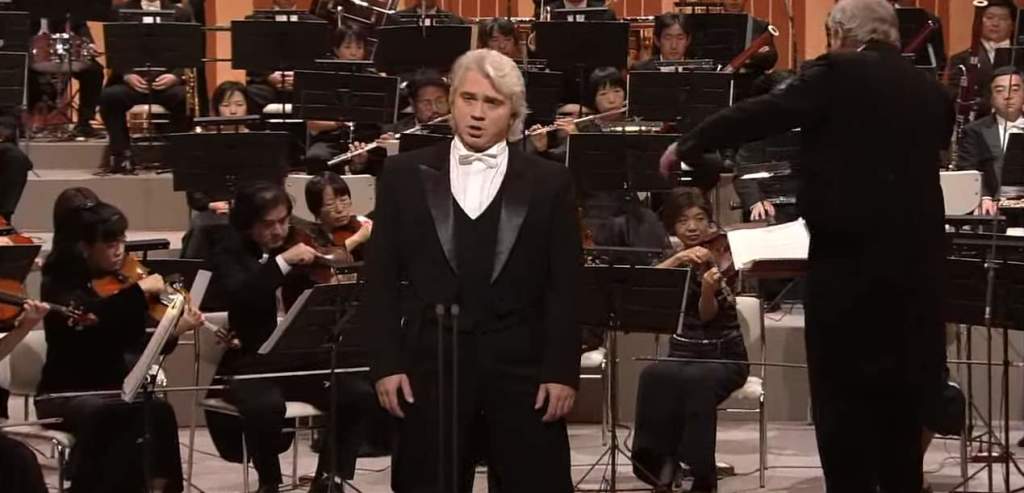Russian operatic baritone Dmitri Hvorostovsky sings the Russian composer Pyotr Bulakhov’s (1822 – 2 December 1885) famous song “Do not awaken memories”.
Pyotr Bulakhov’s Do not awaken memories
“Do Not Awaken Memories,” also known as “Ne budi meminyy” in Russian, is a poignant and evocative song composed by Pyotr Bulakhov. Bulakhov, a Russian composer and singer of the 19th century, was renowned for his contributions to the genre of Russian romance songs. These songs, often characterized by their deep emotionality and lyrical beauty, played a significant role in Russian musical culture.
This particular song, “Do Not Awaken Memories,” stands out for its emotional depth and reflective nature. The lyrics convey a sense of longing and nostalgia, urging the listener not to awaken memories that bring both joy and sorrow. This theme of reminiscence and the bittersweet nature of memory is a common motif in the Russian romance genre, and Bulakhov’s composition captures it with both sensitivity and poignancy.
The melody of “Do Not Awaken Memories” complements its lyrical theme by being both haunting and melodious. It has a quality that evokes a sense of yearning and introspection, making it resonate deeply with listeners. The song typically features a gentle yet expressive musical arrangement, often with a piano accompaniment, which further enhances its emotional impact.
Bulakhov’s work, including “Do Not Awaken Memories,” contributed significantly to the Russian romance tradition, a genre that holds an important place in the history of Russian music. These songs were not just entertainment; they were a reflection of the emotional landscape of the era, often touching on themes of love, loss, and the beauty of the Russian landscape, as well as the complexities of the human experience.
Lyrics (English translation): “Do not awaken memories”
My memories do not awaken.
Of days gone by, of days gone by.
You’ll not return, I am forsaken
My soul does cry, my soul does cry.
You’ll not return, I am forsaken
My soul does cry, my soul does cry.
Don’t cast your fateful glazes on me;
Your wicked eyes, your wicked eyes.
Don’t tempt me now with words of honey.
With empty lies, with empty lies.
When happiness comes, grasp it tightly.
Be thankful then, be thankful then.
And when the fire of love burns brightly.
We live again, we live again.
You who put out that sacred fire,
Oh, let it burn, oh, let it burn.
Those precious hours of love’s desire.
Will ne’er return, will ne’er return.
Pyotr Bulakhov, a significant figure in the realm of Russian romantic music during the 19th century played a pivotal role in shaping the genre known as Russian romance. His contributions are not only evident in the creation of beautiful, emotive compositions like “Do Not Awaken Memories” but also in the way his music encapsulates the sentiments and aesthetics prevalent in Russia during that era.
The Russian romance genre, characterized by its deeply expressive, often melancholic melodies and introspective lyrics, emerged against the backdrop of a Russia undergoing profound cultural and social transformations. The 19th century was a period marked by the clash and coalescence of old-world aristocratic refinement and the burgeoning sentiment of national consciousness and identity. In this milieu, music became a powerful medium for expressing the nuanced emotional landscape of the time.
Bulakhov, with his keen sense of melody and emotion, tapped into this zeitgeist. His songs often reflect a deep longing, a sense of nostalgia, and an introspective exploration of love and loss. In “Do Not Awaken Memories,” for instance, the lyrical plea to not stir past emotions speaks to a universal human experience, while also subtly echoing the broader societal sentiment of a nation reflecting on its past and future.
The aesthetics of Bulakhov’s compositions also mirror the artistic tendencies of 19th-century Russia. There was a notable shift from the grandiose, ornate styles of earlier periods to a more subdued, introspective form of expression. This was evident in various art forms, including literature, painting, and music. Bulakhov’s music, with its emphasis on simplicity, emotional depth, and lyrical beauty, aligned well with this shift.
Furthermore, his work contributed to the popularization and evolution of Russian romance, making it accessible and relatable to a broader spectrum of society. Previously, music of this nature was primarily confined to the aristocratic circles, but composers like Bulakhov brought it into the salons and homes of the emerging middle class, thereby democratizing its appeal and resonance.
Bulakhov’s music thus serves as a window into the soul of 19th-century Russia, reflecting its emotional nuances, cultural shifts, and aesthetic transformations. His legacy in the Russian romance genre is a testament to his ability to capture and articulate the complex emotional and societal dynamics of his time through the power of music.
Lyrics (English transliteration): “Ne probuzhday vospominaniy”
Ne probuzhday vospominaniy
Minuvshikh dney, minuvshikh dney –
Ne vozrodit’ bylykh zhelaniy
V dushe moyey, v dushe moyey.
I na menya svoy vzor opasnyy
Ne ustremlyay, ne ustremlyay
Mechtoy lyubvi, mechtoy prekrasnoy
Ne uvlekay, ne uvlekay!
Odnazhdy schast’ye v zhizni etoy
Vkushayem my, vkushayem my,
Svyatym ognem lyubvi sogrety,
Ozhivleny, ozhivleny.
No kto yeyo ogon’ svyashchennyy
Mog pogasit’, mog pogasit’,
Tomu uzh zhizni nezabvennoy
Ne vozvratit’, ne vozvratit’!
Sources
- “Ne probuzhday vospominaniy” on Lyrics Translate
